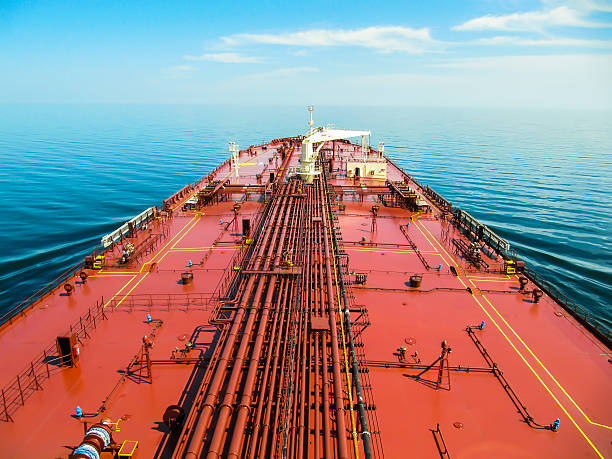Danish Authorities Warn as Large Gas Leak from Pipeline Threatens Shipping

Photo of a big red oil tanker. There is long oil pipeline and cargo crane on deck of this ship. Vessel is steaming in blue, calm water to skyline under blue sky with smooth white clouds.
(TME) Danish authorities have detected a leak from the Nord Stream 2 gas pipeline off the island of Bornholm and have issued a warning to shipping to stay clear.
For reasons not currently known, the pressure in both the Nord Stream 1 and 2 pipelines dropped sharply overnight. Authorities in Germany, which hosts the receiving terminals for both lines, are investigating the situation as a possible intentional act. Given that both lines have gone down, “we can’t imagine a scenario that isn’t a targeted attack,” an individual familiar with the German government’s concerns told Tagesspiegel. “Everything speaks against a coincidence.”
Pressure in the Nord Stream 2 line collapsed from 105 bars to 7 bars overnight, according to Denmark’s maritime authority, and a large bubble field was spotted near the Baltic Sea island of Bornholm. The authority warned that the leak is “dangerous for maritime traffic” and instituted a five-nautical-mile safety zone around it.
Nord Stream 2 was completed last year and filled with natural gas in preparation for its inauguration. However, it never entered service: as Russia geared up to invade Ukraine in February, the German government revoked its operating license, leaving it in permanent limbo. It has remained pressurized but idle ever since.
The United States, Poland and Ukraine strongly opposed the undersea pipeline’s completion, fearing that it would provide the Kremlin a way to guarantee continued gas sales to Germany – even if Russia invaded Ukraine, which hosts Russia’s terrestrial westbound gas pipelines. Despite these concerns, the German government under former Chancellor Angela Merkel pushed for Nord Stream 2’s completion, and the Biden administration decided to allow the project to be finished without imposing sanctions on its developers. The Russian military began staging forces for the invasion of Ukraine about 30 days after the last weld.
Since the start of the invasion, Russian state gas company Gazprom has gradually ratcheted down supplies to the German market, disregarding long-term contracts and upending six decades of continuous energy trade. Gazprom has fully shut down Nord Stream 1 since early September over alleged (and disputed) technical problems; in the West, the decision was widely viewed as retaliation for German support for Ukraine. However, Russian President Vladimir Putin has hinted that gas deliveries could be restored – if Germany simply reverses course and permits Nord Stream 2 to enter service. With Nord Stream 2 now leaking gas into the Baltic, that politically-unpalatable option may be even less likely than before.
*Culled from The Maritime Executive
For reasons not currently known, the pressure in both the Nord Stream 1 and 2 pipelines dropped sharply overnight. Authorities in Germany, which hosts the receiving terminals for both lines, are investigating the situation as a possible intentional act. Given that both lines have gone down, “we can’t imagine a scenario that isn’t a targeted attack,” an individual familiar with the German government’s concerns told Tagesspiegel. “Everything speaks against a coincidence.”
Pressure in the Nord Stream 2 line collapsed from 105 bars to 7 bars overnight, according to Denmark’s maritime authority, and a large bubble field was spotted near the Baltic Sea island of Bornholm. The authority warned that the leak is “dangerous for maritime traffic” and instituted a five-nautical-mile safety zone around it.
Nord Stream 2 was completed last year and filled with natural gas in preparation for its inauguration. However, it never entered service: as Russia geared up to invade Ukraine in February, the German government revoked its operating license, leaving it in permanent limbo. It has remained pressurized but idle ever since.
The United States, Poland and Ukraine strongly opposed the undersea pipeline’s completion, fearing that it would provide the Kremlin a way to guarantee continued gas sales to Germany – even if Russia invaded Ukraine, which hosts Russia’s terrestrial westbound gas pipelines. Despite these concerns, the German government under former Chancellor Angela Merkel pushed for Nord Stream 2’s completion, and the Biden administration decided to allow the project to be finished without imposing sanctions on its developers. The Russian military began staging forces for the invasion of Ukraine about 30 days after the last weld.
Since the start of the invasion, Russian state gas company Gazprom has gradually ratcheted down supplies to the German market, disregarding long-term contracts and upending six decades of continuous energy trade. Gazprom has fully shut down Nord Stream 1 since early September over alleged (and disputed) technical problems; in the West, the decision was widely viewed as retaliation for German support for Ukraine. However, Russian President Vladimir Putin has hinted that gas deliveries could be restored – if Germany simply reverses course and permits Nord Stream 2 to enter service. With Nord Stream 2 now leaking gas into the Baltic, that politically-unpalatable option may be even less likely than before.
*Culled from The Maritime Executive
FOLLOW US
